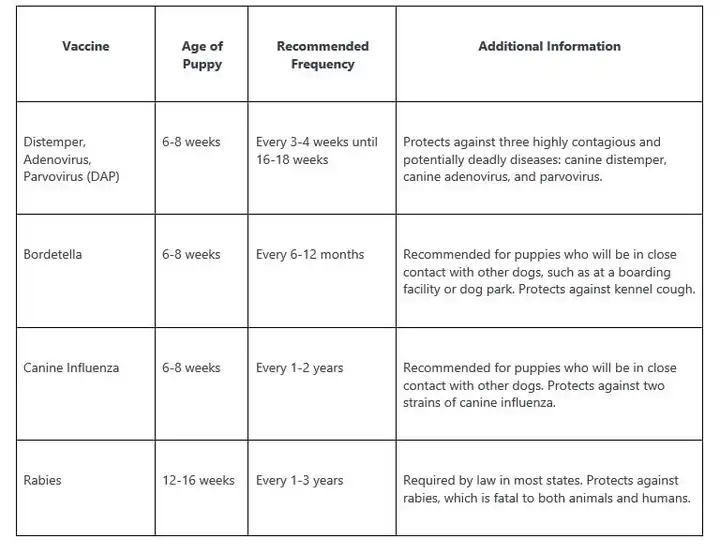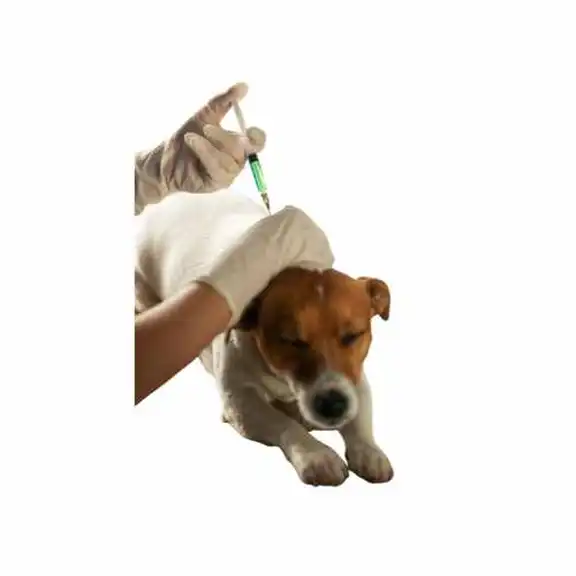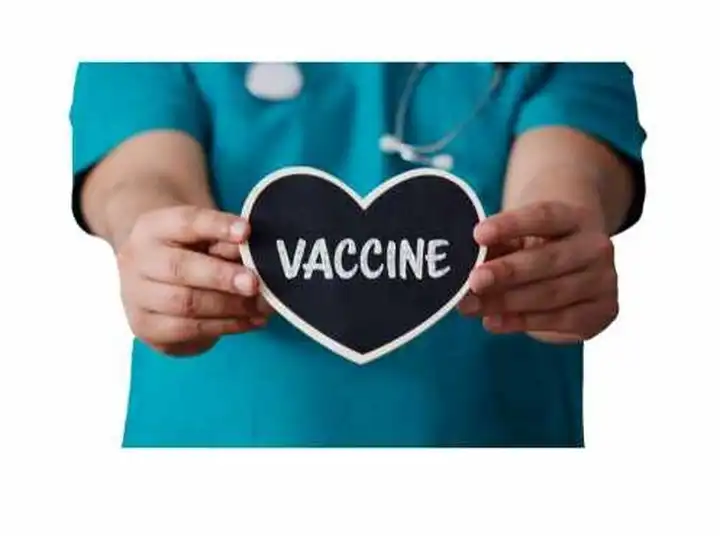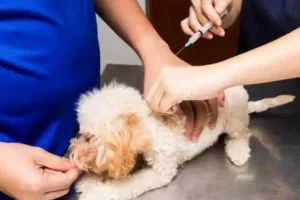When is a puppy fully vaccinated – As a pet owner, ensuring your furry companion remains healthy and happy is paramount. A key component is ensuring that your puppy has been fully vaccinated. Vaccinations aid in preserving puppies from fatal infections and are an indispensable requirement for their overall health care program. This article discusses when young dogs should be given vaccines and what constitutes full vaccination coverage for puppies.
When is a Puppy Fully Vaccinated
The commonness of vaccinations for puppies depends on their age and the particular inoculations needed.
The American Animal Hospital Association (AAHA) suggests that puppies should commence their vaccinations when they are between six and eight weeks old. Subsequent vaccine doses should be distributed every two to four weeks until the puppy is approximately 16 weeks old.
After completing this initial vaccination series, booster shots may need to be taken either annually or triennially, depending on the particular vaccine and as stated by your veterinarian’s advice.

This table offers an overview of each vaccine’s standard puppy vaccination schedule and supplemental information. Data from trusted sources, such as veterinarians and animal behaviorists, has been gathered.
It is essential to remember that this timetable serves as a general reference and that the number of vaccines needed and their regularity can fluctuate depending on your pup’s particular necessities and possible danger. It is always advised to consult your vet when deciding what vaccination plan works best for your puppy.
Types of Puppy Vaccines

Two primary categories of puppy immunizations exist core and non-core. All puppies should be vaccinated with the core vaccines as they protect against numerous diseases that can generate high mortality rates. Non-core vaccinations are not obligatory, yet they should be considered depending on a pup’s lifestyle and habitat.
Core Vaccines
The American Veterinary Medical Association (AVMA) recommends that puppies receive several core vaccinations, including immunizations against distemper, parvovirus, adenovirus, and rabies. It is crucial to ensure your pup’s health by receiving these vaccines.
The core vaccines for puppies are as follows:
- Canine distemper virus (CDV): This contagious and potentially lethal condition impacts the respiratory, gastrointestinal, and neurological systems.
- Canine parvovirus (CPV):A contagion of immense proportions that has the potential to be fatal and impacts the gastrointestinal system, causing extreme dehydration and mortality.
- Canine adenovirus (CAV):A virus capable of leading to severe respiratory illness, hepatitis, and other illnesses has been identified.
- Rabies:A highly contagious ailment that can affect all mammals, it is usually fatal if not addressed quickly.
Non-Core Vaccines for Puppies
Non-essential immunizations may be suggested, dependent on the lifestyle and environment of your puppy. Examples of customary non-core vaccines are:
- Bordetella:Canine Infectious Respiratory Disease (CIRD), typically called kennel cough, is a contagious ailment that can be contracted when dogs are clustered together, for example, at pet boarding facilities and communal dog parks.
- Lyme disease:A bacterial infection spread by ticks that may result in joint discomfort, fever, and tiredness.
- Leptospirosis is abacterial ailment that impacts the liver and kidneys and spreads through contact with impure water or soil.
Booster Shots
Regular booster shots are required to sustain immunity and safeguard against diseases. Puppies typically receive boosters every one to three years, per the vaccine used and their veterinarian’s instructions.
Puppies must receive booster shots as part of their vaccination schedule to protect them from serious health issues caused by infectious diseases. This article will explain when, why, and how often a puppy requires these boosters.
When should your puppy receive booster shots?
Booster shots are administered to puppies following their initial set of vaccinations. The precise timing for booster shot administration will vary, depending on the type of vaccine and the age of the puppy in question.
Generally speaking, boosters should be given at intervals lasting no more than 3-4 weeks until your pup reaches 14-16 months old; after this point, an annual booster is usually recommended as a preventative measure against illness.
Why are booster shots necessary?
Booster shots are essential to reinforce immunity against diseases in puppies. The initial set of vaccinations is important; however, they may need to be more for extended protection. Booster shots provide an additional layer of security by ensuring the puppy’s immunity remains powerful and effective over time.
How many booster shots does your puppy need?
The exact amount of booster shots your puppy requires will depend on the type of vaccine they receive and their age. Generally, puppies need 2-3 boosters following the initial vaccines. It is best to consult a veterinarian to determine an appropriate schedule for your pup based on all relevant factors.
It is imperative to remember that booster shots are equally important to initial inoculations. Ensuring your pup remains up to date on vaccinations can help safeguard them from hazardous contagious ailments. It is recommended to consult with a veterinarian regarding an optimal vaccination schedule for your puppy.
Vaccination Side Effects

Vaccinations are fundamental to the well-being of puppies; however, they can also lead to certain side effects. Typical consequences include fever, lethargy, and tenderness at the spot where it was administered. These responses tend to be gentle and short-lived in nature.
Veterinary care must be sought immediately if your puppy has more serious symptoms, such as vomiting or difficulty breathing.
It is essential to be aware of any potential adverse effects that could arise following your puppy’s immunization.
Below is a compilation of common side effects and information regarding when to seek veterinary care, all sourced from reliable veterinarians and animal behaviorists.
Common side effects of vaccinations in puppies can include:
- Mild fever
- Lethargy or decreased activity level
- Loss of appetite
- Mild swelling or redness at the injection site
- Sneezing, coughing, or nasal discharge
It is conventionally observed that most side effects experienced are minor and naturally dissipate within 48 hours. Nevertheless, in uncommon circumstances, more critical consequences could manifest, including:
- Allergic reactions, including difficulty breathing or swelling of the face, lips, or tongue
- Vomiting or diarrhea
- Hives or rashes
- Seizures or neurological signs
If you notice any more serious side effects, it’s important to seek veterinary care immediately.
It is important to consider that some breeds may be more predisposed to vaccine reactions than others. For instance, the Cavalier King Charles Spaniel has been observed to have an augmented likelihood of experiencing adverse effects from specific vaccines. If you are anxious concerning your puppy’s chance of reacting badly after vaccination, you and your veterinarian should explore these concerns together.
Vaccination Record
Keeping a vaccination record for your puppy is essential to responsible pet ownership.
A vaccination record is a document that details which vaccines your puppy has received, the dates they were administered, and when the next booster is due. Here are some reasons why keeping a vaccination record is important:
- A vaccination record details which vaccines your puppy has received, the dates they were administered, and when the next booster is due.
- Keeping a vaccination record ensures your puppy is up-to-date on vaccinations, protecting them from deadly diseases and keeping them healthy.
- A vaccination record helps your veterinarian provide better care by allowing them to determine which vaccines your puppy needs and when they should be administered.
- A vaccination record may be required for certain activities, such as travel or boarding.
- Keeping a vaccination record can be useful in the future if you ever need to reference which vaccines your puppy has received or when they are due for their next booster.
These points are supported by reputable sources such as the American Veterinary Medical Association (AVMA) and the American Animal Hospital Association (AAHA).
The Cost of Puppy Vaccination

The cost of puppy vaccination varies depending on the veterinarian and the specific vaccines required. According to the AAHA, the cost of the initial puppy vaccination series can range from $75 to $300, with booster shots ranging from $10 to $100. Budgeting for puppy vaccination and discussing any concerns or questions with your veterinarian is essential.
Finding a Local Vet
Finding a trusted veterinarian ensures your puppy receives the best possible care. Ask for recommendations from friends and family, or search online for local veterinarians. Be sure to read reviews and check their credentials before making an appointment.
Puppy Vaccination Packages: Saving You Money
Puppy vaccination packages can be a great way to save money on your puppy’s healthcare while ensuring that they receive all the necessary vaccinations. Many veterinary clinics offer these packages, typically including a series of core vaccinations that puppies need in their first few months of life.
The cost of individual vaccines can add up quickly, so these packages can be a cost-effective solution for new puppy owners. Plus, by purchasing a package, you’ll have the peace of mind of knowing that your puppy is receiving all the necessary vaccines to protect their health.
Read Also: How Much are Puppy Vaccinations at Vets4pets
When considering a puppy vaccination package, it’s important to understand what’s included. Most packages will include core vaccines for distemper, parvovirus, adenovirus, and rabies. Some packages may include additional vaccines, such as those for bordetella or leptospirosis, depending on your area and your puppy’s lifestyle.
It’s important to note that while puppy vaccination packages can save you money, they may not be the right choice for every puppy. If your puppy has specific health needs or if you plan to travel extensively with your puppy, you may need to purchase additional vaccines beyond what’s included in a typical package.
As with any decision about your puppy’s health, discussing your options with your veterinarian is important. They can help you determine which vaccines are necessary for your puppy and whether a vaccine package is the best choice for your budget and your puppy’s needs.
Conclusion
When is a Puppy Fully Vaccinated – Vaccinations are a critical aspect of your puppy’s health care. Following the recommended vaccination schedule and working with a trusted veterinarian can ensure your furry friend stays healthy and happy for years.
References:
American Animal Hospital Association. (2021). Vaccination Guidelines for Dogs and Cats. https://www.aaha.org/aaha-guidelines/vaccination-guidelines/
American Veterinary Medical Association. (2021). Vaccinations for Your Pet. https://www.avma.org/resources/pet-owners/petcare/vaccinations-pets
Cornell University College of Veterinary Medicine. (2021). Puppy Vaccination Schedule. https://www.vet.cornell.edu/departments-centers-and-institutes/cornell-feline-health-center/health-information/feline-health-topics/puppy-vaccination-schedule



